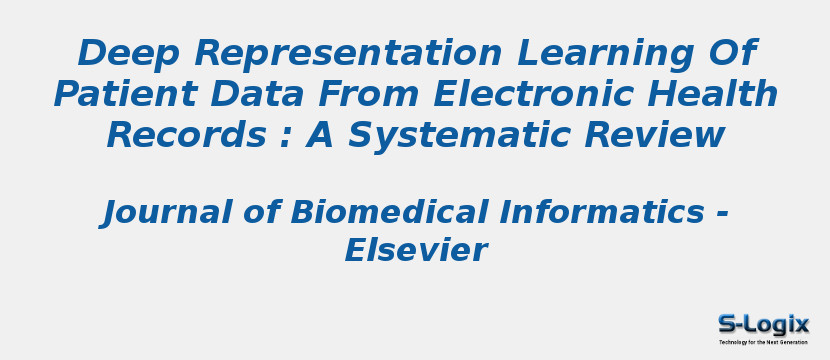Research Area: Machine Learning
Patient representation learning refers to learning a dense mathematical representation of a patient that encodes meaningful information from Electronic Health Records (EHRs). This is generally performed using advanced deep learning methods. This study presents a systematic review of this field and provides both qualitative and quantitative analyses from a methodological perspective.We identified studies developing patient representations from EHRs with deep learning methods from MEDLINE, EMBASE, Scopus, the Association for Computing Machinery (ACM) Digital Library, and the Institute of Electrical and Electronics Engineers (IEEE) Xplore Digital Library. After screening 363 articles, 49 papers were included for a comprehensive data collection.Publications developing patient representations almost doubled each year from 2015 until 2019. We noticed a typical workflow starting with feeding raw data, applying deep learning models, and ending with clinical outcome predictions as evaluations of the learned representations. Specifically, learning representations from structured EHR data was dominant (37 out of 49 studies). Recurrent Neural Networks were widely applied as the deep learning architecture (Long short-term memory: 13 studies, Gated recurrent unit: 11 studies). Learning was mainly performed in a supervised manner (30 studies) optimized with cross-entropy loss. Disease prediction was the most common application and evaluation (31 studies). Benchmark datasets were mostly unavailable (28 studies) due to privacy concerns of EHR data, and code availability was assured in 20 studies.The existing predictive models mainly focus on the prediction of single diseases, rather than considering the complex mechanisms of patients from a holistic review. We show the importance and feasibility of learning comprehensive representations of patient EHR data through a systematic review. Advances in patient representation learning techniques will be essential for powering patient-level EHR analyses. Future work will still be devoted to leveraging the richness and potential of available EHR data. Reproducibility and transparency of reported results will hopefully improve. Knowledge distillation and advanced learning techniques will be exploited to assist the capability of learning patient representation further.
Keywords:
Author(s) Name: Yuqi Si, Jingcheng Du, Xiaoqian Jiang, Zhao Li, Timothy Miller, Fei Wang, W. Jim Zheng, Kirk Roberts
Journal name: Journal of Biomedical Informatics
Conferrence name:
Publisher name: Elsevier
DOI: 10.1016/j.jbi.2020.103671
Volume Information: Volume 115, March 2021, 103671
